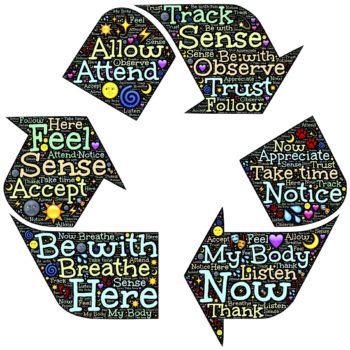How Mindfulness Training Improves the Odds for Your New Year’s Resolution
Well, we’re half-way into February so it’s a good time to ask: How are you doing with your New Year’s Resolutions? Of course, it’s also that time of year when something like 80% of resolutions dissolve each year. Hey, maybe it’s time to actually try something new – like working on mindfulness training to improve your mindset before working on changing your behaviors.
(After all, Mr. Einstein told us many years ago what it means when we keep doing the same old thing while expecting a different result.)
while expecting a different result.)
The reason this happens to 8 of 10 of us is fairly simple… we’re human. The daily grind of life and work become distractions and your enthusiasm for making changes fades. Priorities shift. Old habits hang on relentlessly. You set your sights too high and come up short. Limiting beliefs interfere and keep you from moving forward.
Further, relying on pure will power to push change forward simply does not work for most people.
OK, sure, it does work when things are going well; however, when life happens and stress kicks in, the part of your brain that is providing the will power simply is not accessible – hence, you (and all of us) give in to old familiar habits and then fall into the downward spiral of self-blame.
The number of reasons resolutions are abandoned is nearly as long as the number of people who make them each year.
So, how do you shift this paradigm and alter the outcome?
Train Your Mind, Change Your Life
Real change is hard. Human beings are truly creatures of habit and the familiar is also what’s most comfortable. (Yeah, those slippers are old and ugly, but so comfy!) Yet, though it’s hard to admit, the familiar and comfortable can also let you down; they just stop working. When that happens, change becomes necessary. (Time to get rid of those smelly old slippers!)
In the real world, deliberately making changes is stressful and failing to reach goals is demoralizing. Both can have a profound effect on your sense of self-worth, which can lead to an endless cycle of goal setting, failure, and reduced self-esteem.
Such a persistent train of thought will virtually guarantee you will not realize your goals, this year, next year, or the next.
As explained in an article on failed resolutions at USNews.com:
“The unfortunate truth is that change, all change, entails some degree of emotional friction, which in turn generates a ‘heated state’ we call stress. Whether you’re feeling anxious, depressed, frustrated, fatigued, weak and out of control, or simply bored, emotional friction (stress) becomes the high-octane fuel of failure. When it comes to handling the stress involved in change, many well-adjusted, happy, people share the fundamental problem of self-sabotage.”
Using simpler terms… unless you first change your mindset, you will never change behaviors.
Evidence-based Research Into the Power of a Mindful Mindset
The simplest definition of mindset is: the way you see the world and your place in it, as well as emotional responses associated with this worldview. Needless to say, this has a lasting effect on your behaviors, your values, your level of professional success, and your happiness. The good news is, there is scientific evidence that shows you can take steps to improve your mindset, either with help or on your own.
- In her latest research, Professor Carol Dweck at Stanford University has shown that believing you can improve your abilities is actually more important than believing in your abilities alone.
- Similarly, research done at Harvard clearly shows that by training yourself to see each challenge as a situation to overcome rather than an impossible barrier, you will then experience “good” stress (instead of bad stress), which will cause your body to release the “feel good” enzyme dopamine, leading to a more positive mindset.
- A mindful approach to habit change includes being aware of your mindset; the ability to acknowledge and befriend the parts of yourself that are engaged in sabotaging change. Instead of fighting them, learn to negotiate with these parts successfully. This enables you to take inspired and committed actions in the presence of these unwanted thoughts and emotions, instead of being stuck with them.
It’s the end of the inner war and an invitation to curiosity, creativity, and flow. It is stepping into the power of small consistent steps vs. unrealistic expectations of yourself. Slow and steady wins the race in behavioral change!
(And, you get to say “Goodbye” to the ghost of Mr. Einstein!)
In fact, the latest research into the structure and function of the mind suggests success does NOT lead to happiness; happiness leads to success!
Mindfulness training results:
- Reduction in stress
- Better health, stronger immune system
- Increase in productivity
- Increase in positive social interaction (relationships)
- Increase in emotional intelligence and overall well-being
Wait, wut!?!
If getting smarter is not the best reason ever to develop a mindful mindset, it’s hard to imagine what is. Plus, you’ll really increase the odds of successfully realizing this year’s resolution, as well in years to come! Then again, I can help you with that, through mindfulness training and exercises.
Click here to schedule your FREE Discovery Call.
